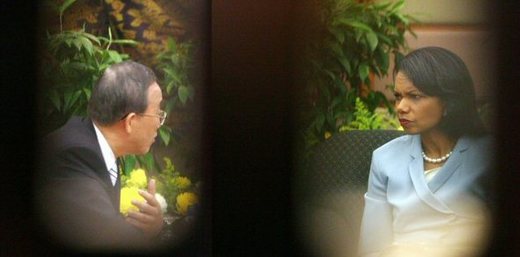Posted on : Jul.31,2006 12:37 KST
Modified on : Aug.1,2006 11:03 KST
 |
|
South Korea's foreign minister Ban Ki-moon (left) holds a meeting with U.S. secretary of state Condoleeza Rice in Kuala Lumpur on July 28.
|
During the 13th Association of South East Asian Nations (ASEAN) Regional Forum, held in Kuala Lumpur July 27-28, North Korea indicated that it was not the ‘time for negotiation’ on its nuclear and weapons programs.
The communist regime may think that Washington will never lift financial sanctions against the North, even if Pyongyang continues to demand that the U.S. do so, but it would be difficult for the North to return to the six-party talks without any concessions made by other countries on its behalf, especially after the U.N. Security Council adopted a resolution against it.
Pyongyang is likely to attempt a bigger, more dangerous, ‘bargain’ for the current missile crisis. It is probable that North Korean media may attack the weak points of U.S. policy, considering the upcoming off-year elections in that country. In addition, with the North failing in its attempt to have undersecretary or secretary-level talks with China, it might now try to seek a solution between heads of the two countries. As well, the isolated country is going to take into consideration the South Korea-U.S. summit due to take place in mid-September.
Diplomatic experts predict that the future of the Pyongyang-Washington relationship - the direction of Washington’s North Korean policies, in particular - will play an important role in dictating the future moves of the North. Above all, the agreement to be reached at the South Korea-U.S. summit in September and current U.S. policy to step up pressure against the North are expected to influence the future policies of Pyongyang. If the international community, including the United States, strengthens sanctions against North Korea, Pyongyang may play an unpredictable 'card' to heighten tension, many experts say.
But until mid-August, North Korea will probably take a wait-and-see approach. The North is expected to reevaluate its strategies at that point, and to review countermeasures multilaterally.
According to some sources, there may be voices in North Korea claiming someone in the government should take responsibility for the current tensions. "As far as I know, public opinion [in the North] is unfavorable toward the North Korean military," a source said on condition of anonymity, citing the fact that the North has become even more seriously isolated in international society.
The North, however, will not sit idle, merely killing time, as food aid from the South has stopped and the nation was severely hit by recent torrential rains. Pyongyang Radio yesterday criticized the South Korea-U.S. joint Ulchi-Focus Lens (UFL), or joint military exercises, as a declaration of war against the North. Such a move may be a strategy for confronting the joint military exercise in the future. Pyongyang may use it to justify further test-fires of Taepodong-2 missiles, as it did at the beginning of July.
Ahead of the state-level elections in the U.S. this fall, the North will attempt to show that the proliferation policies of the Bush administration have failed. If this problem becomes an issue in the elections, it will be difficult for the U.S. administration to consistently "ignore" Pyongyang.







